
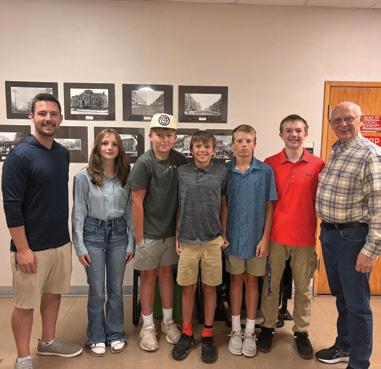




What do paper plates, straws, water bottles and balloons have to do with renewable energy? Quite a bit if you are 12-year-old Carter Semrau.
Working with fellow campers, the seventh-grader from Hartford used these items to build a model wind turbine and understand how corn ethanol is made.
Continued on Page 8
SATURDAY, AUGUST 30
Join Us in the FARMERS UNION TENT by the FREEDOM STAGE Events begin at 11:30 Free Admission Available to Farmers Union Members just call Samantha Olerud at 605-554-3023 or email solerud@sdfu.org Turn to Page 6 to learn more.
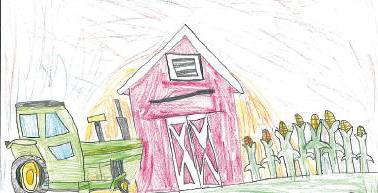


John and Stacy Zomer with daughter and son-in-law Samantha and Taylor Zeutenhorst on the
On a Monday evening in April 2023, the Minnehaha County Commission approved a request to build a 450-head hoop barn for calving and feeder cattle.
“When it was time to vote, the chair of the commission asked his fellow commissioners, “when was the last time that we had a young man come in here asking for a building permit because they wanted to be in the cattle business?” This made me think in Minnehaha County they don’t see young people getting into the cattle business anymore,” said John Zomer, of the request he and his son-in-law, Taylor Zeutenhorst made. “Cow/calf producers are a dying breed. We did not hide the fact that we need this Zomer/ Zeutenhorst Family
Continued on Page 2

Zomer/Zeutenhorst Family
Continued from Page 1
barn so we can expand so that our family farm can be sustainable.”
When the Minnehaha County Commission granted the permit, it was a sign that the Zomer/

“I always knew I wanted to be an over-the-road trucker – that is my first love. And I wanted to be a farmer – a close second love.”
– John Zomer
Zeutenhorst family farm would be around for the next generation.
Building a family farm that is sustainable has been a life-long goal of John Zomer.
“Growing up on a small Iowa dairy farm, I always knew I wanted to be an over-the-road trucker – that is my first love. And I wanted to be a farmer – a close second love,” John explained.
He knew his goal of farming was a bit farfetched because he is one of nine children. So, at the age of 22, he focused on his first career aspiration and purchased a 1985 Peterbilt 359 and a 1980 Merritt trailer and began hauling livestock across the U.S.
“I grew up in a time when you just expected to make your own way,” John said.
For nearly a decade, John hauled dairy cattle from New York to California – unloading cattle for 12-hour water breaks in Nebraska and Utah cattle yards along the way. “The difference between truck drivers who haul freight and those of us who haul livestock, is the freight drivers get to sleep at night and the ones who haul livestock don’t,” John said.
Together with his brother, Hank, Zomer Brothers Inc. expanded to 25 drivers, and the brothers began selling trucks and trailers out of a lot in Sioux Falls. In 2000, John and Hank decided to sell their livestock hauling business to focus on Zomer Truck and Trailer Sales and Service.
Because of hauling livestock, John was closely connected to the needs of agriculture producers and saw many producers in need of semitrucks and trailers as they expanded their crop acres to meet demand created by the expanding ethanol industry.
“We sold hundreds of trucks and trailers to farmers who were first time truck owners. So, with my experience as a driver, I made sure we helped them get comfortable with owning a truck and trailer. We do a lot of teaching and training,” John said.
While building up his trucking businesses,

John and his wife, Stacy were also building their family. With four children under 8, Stacy was eager to help John get started on his second dream of farming. She wanted to raise their children in the country. So, when a longneglected farm came up for sale just a half mile south of Valley Springs, she encouraged John to keep bidding during the foreclosure auction.
“I pretty much made John buy this place. I could tell that he was feeling closed in living in town and even though I had never lived in the country, I wanted our children to grow up here,” Stacy explained.
Planting maple trees to line the drive running from the main road to their farmhouse was among the first of many projects the Zomer family undertook as they cleaned up the rundown farmstead and built a new home for their family.
Twenty-two years later, mature trees and several modern outbuildings welcome family, friends and truckloads of cattle.
Although all of John and Stacy’s six children live in Valley Springs, most no longer live at home. Their son, Caleb, and son-in-law Taylor Zeutenhorst, work full-time on the farm which includes cropland and pasture acres throughout South Dakota.
“The original piece of farmground was only 100 acres and I knew that I could expand faster if I went north because land was less expensive than it was around Valley Springs,” John explained. “And we are in the trucking business, so hauling equipment or cattle doesn’t faze us.”
Although hauling cattle and farm equipment between fields or pastures can be a bit much, Caleb said he feels fortunate that the family farm has expanded enough that he can work fulltime.
“I never saw myself doing anything different,” explained the 23-year-old. “I could not imagine sitting behind a desk. I enjoy working with my hands, and with the farm I am working not just with my hands, but my head too.”
Prior to John asking him to return to the farm full-time, Caleb spent three years after
high school working for a flooring company. He said he did not see a future in this. But working on the farm with his family is different. “If I am blessed enough to have a family someday - raising kids on the farm is a great way to get them involved and I believe it teaches them to be responsible,” Caleb said.
Triple Z Angus
Taylor Zeutenhorst started working for John on the farm in 2015 when he was taking a break from college. He was on track to get a degree in physical therapy and realized it was not for him.
“I was shadowing physical therapists during their workday and realized, I was an outdoor kid, and this was not the right fit for me,” Taylor said. “I was telling John that I was thinking about dropping out of college because I knew he had a vested interest since it was obvious that Samantha and I were going to be in this until the end, and I was wondering what to do. John offered that I could work at his shop. And then I started helping him in the field and hauling grain.”
During harvest two years later, John asked Taylor what he thought about diversifying the farm and expanding into the cow/calf business.
“I suggested we diversify by getting into the cow/calf business because it is the only part of the livestock industry that the conglomerates are not involved in,” John said. “And I remembered from my years of hauling livestock that we had a lot of customers who constantly complained about dealing with the big four packers.”
Taylor agreed to give it a go. “I grew up in Rock Valley, Iowa where there are a lot of cattle producers. I have an uncle who raises feeder cattle, so the idea of raising cattle was not completely foreign,” Taylor said. “We bought 55 cows and heifers. That first calving season I fell in
love with it. It is interesting how things turn out. During school I had been so focused on helping people, and now, here I am helping livestock.”
Triple Z Angus partnership was formed in 2016, the same year Taylor and Samantha got married. John manages most of the marketing, Taylor takes care of the herd and breeding decisions, and Samantha handles the book work.
From the start, John and Taylor relied on veteran cattle producers for advice and guidance. And although there was a significant learning curve, things were going pretty well –and then calving season 2019 happened. During spring 2019 it was either raining or snowing.
“I was checking cattle in the yard in the chest waders I wore for duck hunting because there was 2-feet of mud everywhere and my muddy jeans were wrecking our washer and dryer,” Taylor said. “We moved the machinery out of sheds to try and get the cows and calves out of the mud. It was a disaster.”
“We had major death loss,” John added. “Taylor worked his heart and soul out trying to keep those calves alive and I said to myself, “if he is still in this after this year, he is in it for the long haul.”
Even with 30 percent death loss, Taylor did stick it out. But a lot changed after spring 2019. He made the decision to move calving season to begin in January and Triple Z Angus began working on the permission they would need to build a hoop barn for calving.
To maximize their investment, they decided to finish their calves and others so that the barn would remain full year-round. “To build a barn

By the nature of their work, family farmers and ranchers are proudly independent. But when it comes to establishing ag-friendly policy, it’s best to unite, explained Kimball cattle producer, Ryan Urban.
“If it is each of our voices independently, it’s tough to be heard. But if you get a bunch of farmers and ranchers together and we ask collectively – it gives us a much bigger voice,” Urban said. “This is the reason Samantha and I are involved in Farmers Union.”
Amplifying the voice of family farmers and ranchers when asking policymakers to support grassroots policy is a primary focus of South Dakota Farmers Union and the National Farmers Union organization explained Jeff Kippley, Vice President of National Farmers Union and South Dakota Farmers Union.
“It’s a big deal to have a lot of farmers and ranchers in D.C. at one time,” explained Aberdeen farmer Jeff Kippley. “When farmers and ranchers actually travel to D.C. and sit down with leaders to talk about the issues they face and share their stories to explain why they need certain policy changes, it has a powerful impact.”

Kippley shared that while NFU employs lobbyists to advocate on its members behalf, when the individuals who do the work show up, it is impactful.
“Our lobbying staff are not farmers. They relay the stories of farmers and ranchers, but when the story comes from personal experience, in-person, it catches Congressional leaders’ attention,” Kippley said. “They realize farmers and ranchers are not some mythical people from faraway lands who are having an issue. This person, right in front of them is facing an issue.”
The 2025 NFU D.C. Fly-In will be held Sept. 8-10. Each year, South Dakota Farmers Union sponsors several South Dakota farmers and ranchers to travel to Washington, D.C., to join with about 400 producers from across the nation to meet with Congressional leaders to advocate for policy that will support and strengthen agriculture.

said
“With extreme turmoil over getting the Farm Bill passed and a split coalition, we need to have our voice heard about the serious impact the Farm Bill has on rural America,” said Sombke, a fourth-generation Brown County farmer. “Our members consider passing the Farm Bill critical because this bill impacts so many South Dakotans – farmers, ranchers, schools and food insecure families.”
During the Fly-In family farmers and ranchers sit down for conversations with Congressional leaders and their staff.
Samantha Urban said when she and Ryan participated during the 2024 Fly-In, she learned a lot from the experience of meeting one-on-one with Congressional leaders and their staff. “It was a great experience and taught me that what goes on in D.C. is not a straightforward process,” Samantha explained. “I could tell by their questions that they were really listening to us, and they were interested in what we had to share.”
Ryan agreed. “The Fly-In is hands-on advocacy. We are in D.C. meeting with the decision makers and promoting what farmers and ranchers need as far as ag policy goes.”
Fly-In participants also have an opportunity to hear from U.S. Department of Agriculture staff. To learn more about the 2025 D.C. Fly-In, visit www. sdfu.org n by Lura Roti for SDFU Zomer/Zeutenhorst Family Continued from Page 3
and use it only 60 days a year is not feasible. We had to increase our profits to keep Triple Z Angus alive. It’s all part of building a sustainable family farm,” John explained.
Today, while Taylor spends his days outdoors, John and Samantha share an office at Zomer Truck and Trailer sales and service. Since the birth of their oldest son, Theo in 2022, Samantha has worked as assistant manager. In 2024, she and Taylor welcomed their second son, Milo. Grandma Stacy watches Theo and Milo on Mondays and Samantha spends Fridays on the farm with her sons.
“They are 1 and 3 and are already both obsessed with tractors and trucks and cows – it’s all they talk about,” Samantha said. “Raising them on the farm teaches them responsibility and hard work and if they want to, when they grow up, hopefully they can continue the farm.”
With the future of Triple Z Angus in mind, Taylor is focused on herd genetics and implemented a cross-breeding program. “Head count is nothing if the genetics are no good,” Taylor said. “I would rather have fewer cows and have them be good mothers and offspring that are healthy, productive and have a good temperament.”
The family is also working to build a strong relationship with the community of Valley Springs. They hosted their first Open House September 2024. More than 100 attended the event that included Triple Z Angus burgers, bouncy house for kids and a flatbed farm tour.
“We want to be good neighbors and since we live so close to town, we want to provide the opportunity to show our neighbors what we do here on the farm and answer their questions,” John explained. n by Lura Roti for SDFU

For as long as he can remember, 13-year-old Chord Blotsky wanted to become a leader in his community. So, he was pretty excited about the recent opportunity he received to meet the mayor of Mitchell, Jordan Hanson.
“It was really fun to meet Jordan because I like the idea of someday getting elected to run a city and help out my community,” explained Blotsky, who lives on his family’s ranch near Winner. “I got to ask him questions about his job as mayor and Jordan talked to us about how he takes things into consideration when making decisions.”
Blotsky was one of five South Dakota youth to meet with Hanson as

part of a South Dakota Farmers Union (SDFU) Legislative Educational Retreat reward trip designed to educate teens about grassroots policy development and civic engagement. The other teens to attend were: Bryn Marvel, Aberdeen; Kyle Olson, Aberdeen; Gabe Florence, Aberdeen and Aaron Kippley, Aberdeen.
“These youth are the future generation. They are the individuals who will one day take on these positions of leadership, so we want them to have an opportunity to learn from the local leaders, and understand what it means to be involved in their communities,” explained Samantha Bowman, Education Program Specialist.
In addition to meeting with Hanson, youth also got to meet with Davison County Commissioner John Claggett and sit in on SDFU Annual Policy Meeting.
“These teens have all been involved in Farmers Union camps, so they have learned a bit about policy development, but this is an opportunity for the teens to see firsthand what it means when we say that Farmers Union is a grassroots organization,” Bowman said. “They got to see members discuss local issues and propose policy to address them.”
The youth earned the opportunity to attend this two-day reward trip by participating in Farmers Union camps and volunteering to help out during Farmers Union County day camps.
In addition to meeting with local leaders and attending the Annual Policy meeting, the teens enjoyed a tour of the Corn Palace and mini golf at Farmlife Creamery in Ethan.
Youth also toured Performance Pet, a manufacturer of canned cat and
Legislative Educational Retreat Continued on Page 12
Family farmers and ranchers will be celebrated August 30, during South Dakota Farmers
Union Day at the South Dakota State Fair.
“Agriculture is the state’s No. 1 industry, so our organization works to ensure fairgoers have a chance to meet the families doing the work as well as gain a better understanding of the challenges these families face as they work to feed America,” explained Karla Hofhenke, Executive Director of South Dakota Farmers Union.
To accomplish these goals, South Dakota Farmers Union provides opportunities for fairgoers to meet family farmers and ranchers throughout the day. And the premiere sponsor of the South Dakota State Fair hosts a Farmers Share Lunch, providing a pulled pork sandwich, chips and milk lunch to 1,000 fairgoers for 52 cents – the amount farmers receive for the lunch ingredients sold in grocery stores.
“After a fairgoer learns how little we receive for the food we produce, they say it really opens their eyes,” said Scott Kolousek, a fifthgeneration Wessington Springs cattle producer.

“We as individual farmers and ranchers don’t have a lot of time to tell our story, but we know that if we don’t make time to tell our story, someone else will. This is the reason our family are Farmers Union members – this grassroots organization is run by farmers. It provides us with opportunities, like State Fair, where we can tell our story.”
– Scott Kolousek
“When beef hits $8 a pound in the grocery store and buns are $3, we believe it is important that consumers understand those of us raising the cattle and the wheat are only receiving a fraction of the amount they spend at the grocery store.”
Kolousek is among a group of Farmers Union members who make time each year during State


Fair to meet with fairgoers – handing out stickers and backpacks with farm-friendly messaging.
“We as individual farmers and ranchers don’t have a lot of time to tell our story, but we know that if we don’t make time to tell our story, someone else will,” Kolousek said. “This is the reason our family are Farmers Union members –this grassroots organization is run by farmers. It provides us with opportunities, like the State Fair, where we can tell our story.”
During Farmers Union Day at the South Dakota State Fair, FFA teams from Brandon Valley, Canton, Howard and Wessington Springs will compete for cash and championship title during the 2025 Farm Safety Quiz Bowl championships.
“It’s important all youth understand how to stay safe on farms and ranches because agriculture is our state’s No. 1 industry – and the work involved can be dangerous,” explained Doug Sombke, President of South Dakota Farmers Union and a fourth-generation Brown County farmer.
South Dakota Farmers Union will also host a panel of legislative leaders, local officials, and

state tax experts for a forum focused on property tax. Fairgoers are encouraged to join in the discussion during Who Pays the Bill? South Dakota’s Property Tax Crossroads forum.
During the moderated discussion, panelists will discuss a wide range of property tax issues, from school funding to county roads, and how growing frustrations about rising valuations and tax burdens are encouraging lawmakers and taxpayers alike to ask tough questions like – Is the system fair, sustainable, or due for a major overhaul?

All Farmers Union activities will take place under the Farmers Union tent and on the Freedom Stage :
11:30 a.m. Farmers Share Lunch – Farmers Union Tent
1 p.m. Who Pays the Bill? South Dakota’s Property Tax Crossroads – property tax discussion panel –Freedom Stage
2 p.m. Farm Safety Quiz Bowl Championships – Freedom Stage : To learn more, visit www.sdfu.org n

State Camp Continued from Page 1
“I learned a lot about renewable energy,” Semrau explained. “It was fun to see how ethanol is made from corn that farmers grow so that we can have lower carbon emissions.”
Semrau was among nearly 80 youth from across South Dakota to attend Farmers Union State Youth Camp held at Camp Byron near Huron, July 20-23, 2025.
Gaining hands-on knowledge about farmers and ranchers’ role in South Dakota’s renewable energy production was among the educational goals of the 2025 South Dakota Farmers Union State Youth Camp, explained Samantha Bowman, S.D. Farmers Union Education Program Specialist.
“It’s important that youth understand the basics of what renewable energy is because a lot of renewable energy is produced in South Dakota by our state’s farmers and ranchers,” Bowman


Scan with your smart phone to watch video messages from campers and counselors
June and was selected to serve on the Jr. Junior Advisory Council (Jr. JAC)
Serving as a camp counselor is something Huron High School Freshman Liberty Doerr has looked forward to doing since she was a camper at State Youth Camp. “I have been attending Farmers Union Camp for as long as I can remember and I always saw the counselors having a lot of fun, so I wanted to be one,” explained Doerr. “I enjoy being a camp counselor because I get to see younger campers enjoying the traditions I love, like singing songs, the bon fire, flag raising and lowering.”
Other counselors were: Danielle Kruger, JAC, De Smet; Riley Mutter, Sturgis; Raymond Wynia, Wilmot; Avril Fletcher, JAC, Highmore; Chaz Blotsky, Hidden Timber; Chord Blotsky, Hidden Timber; Liberty Doerr, Huron; Madi Raymond, Senior Advisory Council, Ethan; Lily Blume, Redfield; Allison Schulz, JAC, Lennox; Cally Faulhaber, Plankinton; Coltyn Raymond, JAC, Ethan; Chloe Culver, Huron; Aaron Kippley, Aberdeen and Lorelei Ruhnke, Pierre.
“It has been really great to see the campers from State Leadership Camp step into this role as a leader for younger campers attending State Youth Camp,” Bowman said. “I think the responsibility gives them a sense of pride.”
Ziplines, Archery & Camper-led Cooperatives
In addition to learning about renewable energy, during State Youth Camp, campers had an opportunity to gain first-hand knowledge into what cooperatives are and how they operate. Day-one, campers are assigned to one of five cooperatives: newspaper, housing, store, insurance and credit union And together they run for board positions and operate the cooperative.
“Because we live in South Dakota where there are so many cooperatives, learning about cooperatives during camp will help these kids in their future,” said counselor Lorelei Ruhnke, a high school sophomore from Pierre. “They may become members of a cooperative or want to
Flag raising and lowering ceremonies as well as games and songs are among the many Farmers Union Camp traditions.

work for one.”
Ruhnke is helping guide campers who are members of the newspaper cooperative. This cooperative sells ads to promote other cooperatives and shares camp news. During the first meeting, Maizy Ogren, an 11-year-old from Harding County was elected board President.
“As board President I am going to make thoughtful decisions and consider everyone’s opinion because in a cooperative all members have a voice,” Ogren explained.
In addition to electing board officers, during their first meeting, campers created posters to promote their cooperative and encourage other campers to buy ads. While she was coloring her poster, Bexley Perrion, a 9-year-old from Ipswich said she was having fun at camp, “because I get to be away from my parents and have some time to be by myself with friends.”
Perrion lives on her family’s farm and is the oldest of three. Brylen Eastlick, a 12-year-old from Humboldt agreed with Perrion. 2025 is Eastlick’s third year to attend Farmers Union Jr. State Youth Camp.
said. “In fact, most of the corn we see in fields throughout South Dakota will be harvested for ethanol.”
Although the corn raised on her family’s Brown County farm is sold to ethanol plants, 11-year-old Moriah Kippley said she still learned quite a bit about non-renewable and renewable resources from the hands-on activities.
“I like the fact that you can make more corn because you can keep growing corn, but there are some resources that you can not make more of,” Kippley said.
Comments like this make counselor Ethan Mutter smile. “It’s fun to see the kids learning about renewable energy through these activities,” said the Sturgis Brown High School sophomore.
Mutter was one of 12 high school students who serve as camp counselors. He attended S.D. Farmers Union State Leadership Camp in

“I like making friends during camp,” Eastlick said. “And I like to come to camp with my friend. And because I think camp is really fun, I got another friend to come this year and my younger brother.”
In addition to learning, ensuring campers have fun is a top priority for counselors and Farmers Union staff. During the four-days, campers enjoy camp traditions like songs and campfires. They also enjoy camp activities like archery, zipline, scavenger hunts and games.
“I have so much fun at camp, I have so many friends and cousins who are here,” said Declyn Schmidt, a 10-year-old from Tripp. “And I’m excited for archery.”
To learn more about South Dakota Farmers Union youth programing, day camps, teen camps and Farm Safety Trailer, visit www.sdfu.org n by Lura Roti for SDFU
















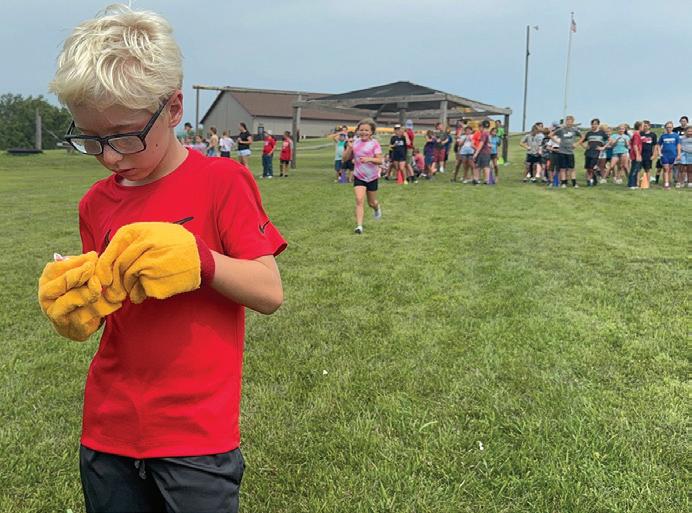

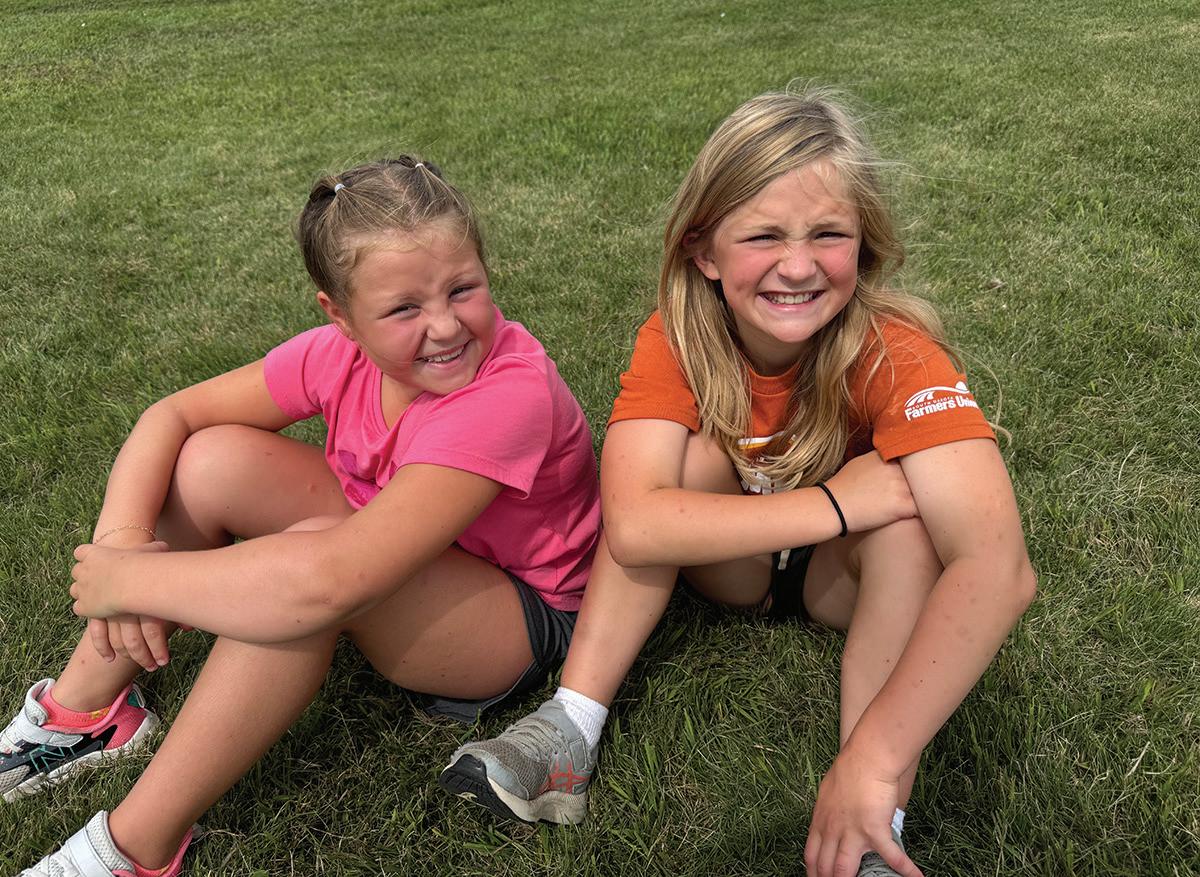




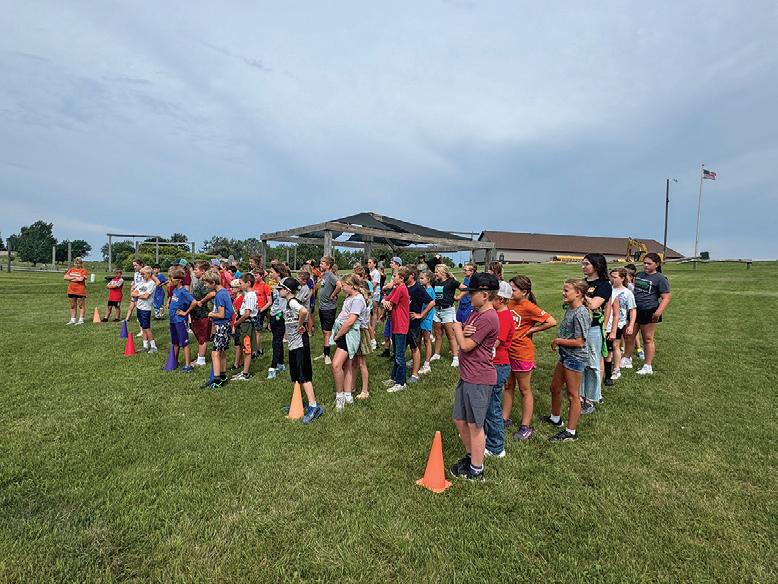




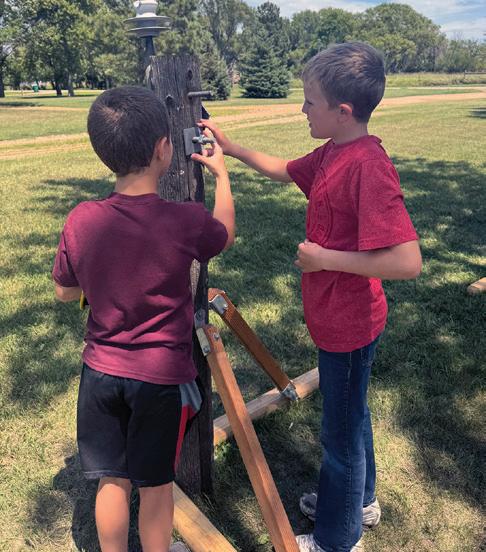



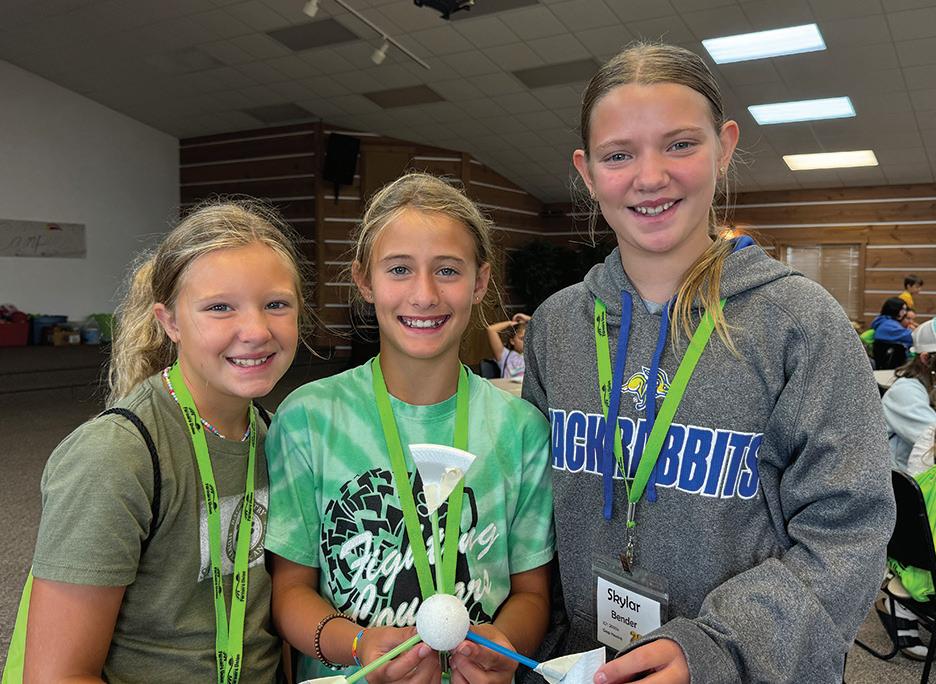


Rural youth shared what comes to their mind when they hear the words, “Ready Set Grow,” competing in the South Dakota Farmers Union Coloring Contest. Contest winners - Division I Winners: Azley Ockenga, 7, Minnehaha County; Bennett Clarke, 8, Minnehaha County; Maura Berg, 6, Grant County; Amelia Keintz, 8, Marshall County; Ivan Weber, 8, Davison County; Division II Winners: Jazmine Bau, 11, Spink County; Evolet Lopez, 10,
and Paxton, 11, Grant County.

County; Erynn








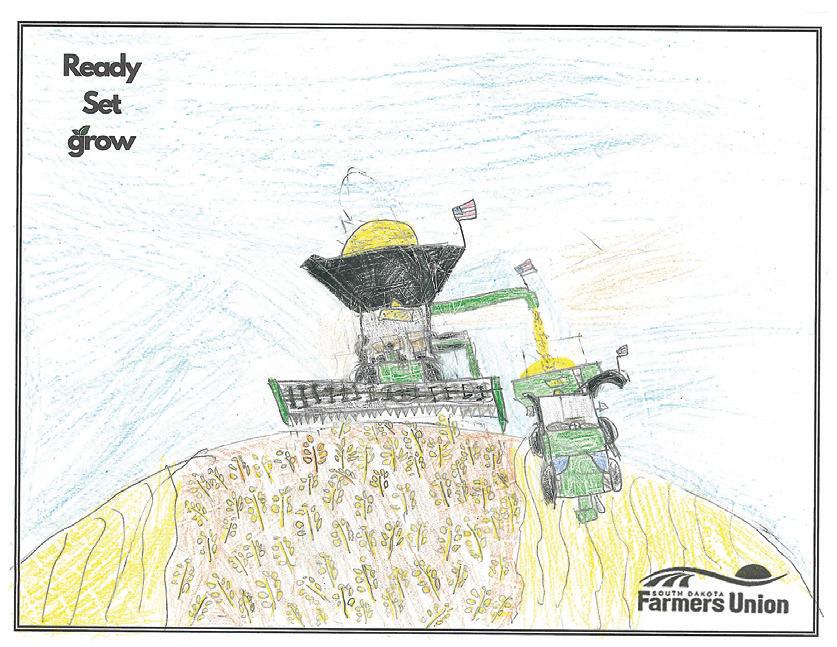













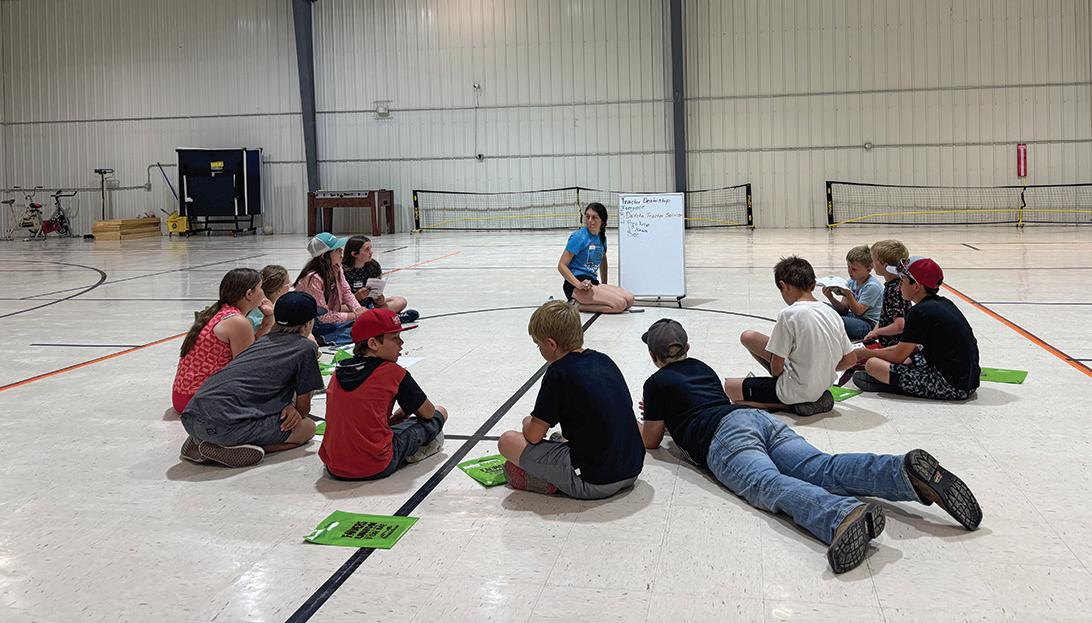
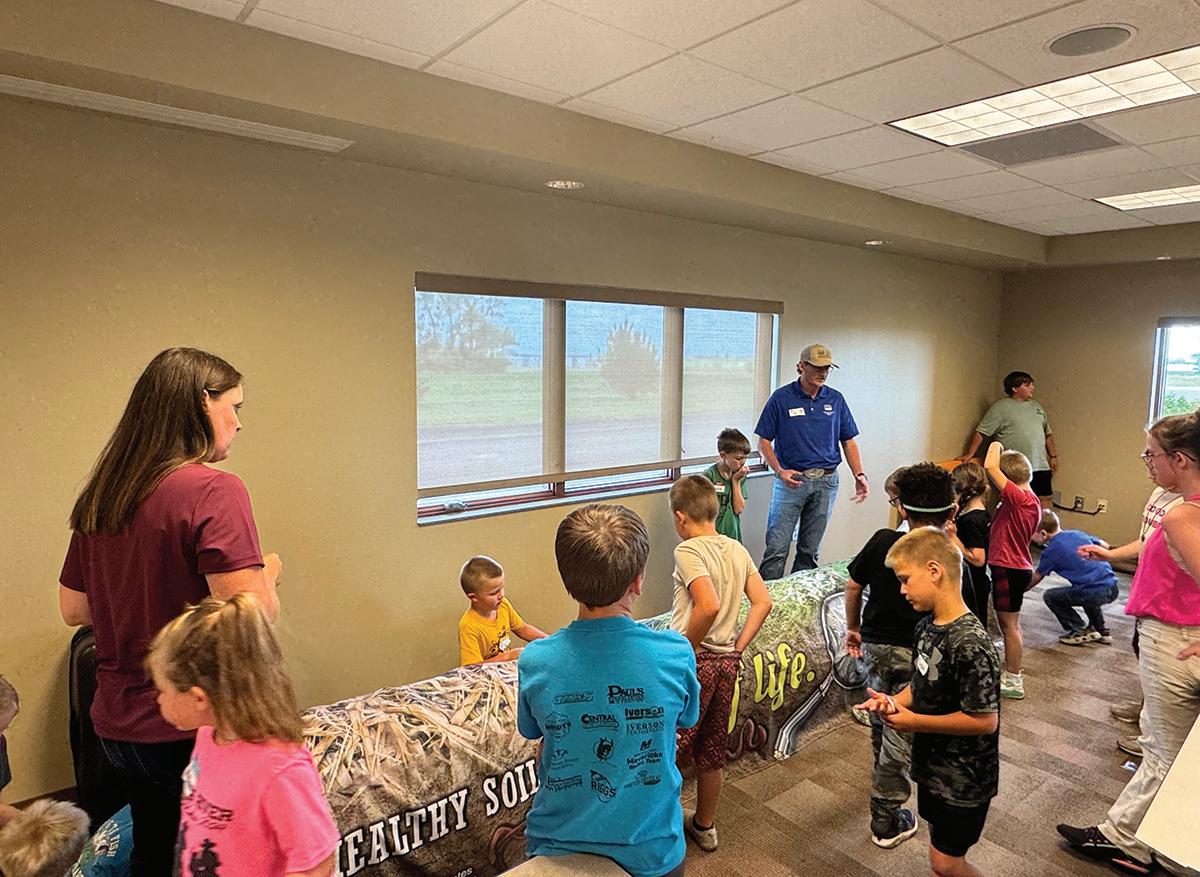












Enjoy these photos submitted by photographers across South Dakota as part of the 2025 Capturing Life on South Dakota’s Farms & Ranches photo contest. Want to submit your own photos? All photos need to be entered through the SDFU website, click on Photo Contest link under the News & Events tab. n




dog food and is one of several businesses owned by Farmers Union Industries. Sixty percent of all profits are returned to Farmers Union organizations, like SDFU.
“It was interesting to see how pet food is made,” said Bryn Marvel. Marvel was especially interested because she has a blue heeler mix named Luna.
“We work every day to support the farmers, ranchers and their families because Farmers Union understands that the future of South Dakota’s number one industry of agriculture is only as strong as the families who do the work.”
– Karla Hofhenke, Executive Director, SDFU
For more than a century, providing hands-on educational experiences for rural youth has been a focus of South Dakota Farmers Union.
“We work every day to support the farmers, ranchers and their families because Farmers Union understands that the future of South Dakota’s No.



1 industry of agriculture is only as strong as the families who do the work,” explained Karla Hofhenke, Executive Director of SDFU. “Agriculture in South Dakota needs leaders of all ages.”
To learn more about South Dakota Farmers Union youth programming, visit www.sdfu.org n by Lura Roti for SDFU

addition to learning

Farmers Union members from across South Dakota gathered virtually and in-person to begin development of 2025 policy during the Annual Policy Meeting held July 17.
“The Policy Meeting is important to the grassroots policy process,” explained Wayne Soren, a Lake Preston farmer and former Vice President of South Dakota Farmers Union. “It is always interesting to hear from members from across the state to hear what is impacting them most on their farms and ranches.”
Additions and changes to the organization’s policy recommended during the July meeting, will be voted on during the 2025 State Farmers Union Convention held in December.
“The Policy Meeting is important to the grassroots policy process.”
– Wayne Soren
All members were invited to participate in the meeting, which is led by the Policy Committee: Hank Wonnenberg, Dist. 4; Sarah Perrion, Dist. 7; Rob Lee, Dist. 3; Audra Scheel, Dist. 2; Jason Latham, Dist. 8 and David Cap, Dist. 1. The Policy Committee meets throughout the year to review the Policy Book and make recommendations for clarifications, additions or changes to ensure the policy remains relevant.
“This meeting is just the beginning. Policy is finalized during the State Convention, so there is plenty of time for members to do their research on proposed changes and there is plenty of opportunity to bring up new ideas,” said Lee, a De Smet farmer, represents District 3 on the Policy Committee. “During this meeting, I am reminded that Farmers Union is an organization that does not just say they are grassroots – through their actions, Farmers Union shows it truly, truly is grassroots.”
2025 Policy Meeting was the first time Northern State University student; Patrick Olson attended a Policy Meeting. In June, Olson was elected to serve on the National Farmers Union Youth Advisory Council. The 18-year-old said the experience was eye-opening.
“It was a really cool experience to see the process that goes into setting policy,” Olson
said. “Members apply intention and purpose to every word they propose for policy. It really demonstrated to me how much these farmers and ranchers care about Farmers Union policy.”
A Farmers Union member since the mid1970s, Soren has been participating in Policy Meetings and discussions for several decades. He said it is encouraging to see young members like Lee and Olson engaged in policy.
Meeting Continued on Page 16


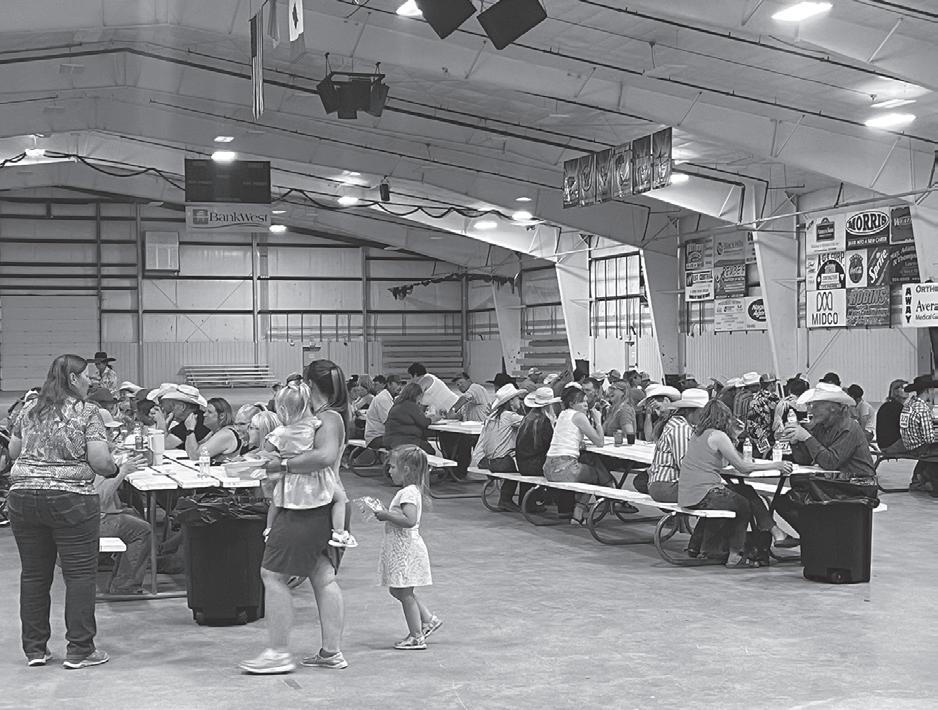




Doug Durante, Clean Fuels Development Coalition
The massive Trump legislation passed last month with some tax goodies for ethanol and biodiesel. Up to a $1 per gallon tax credit survived the legislative process and could mean great returns for ethanol plants that demonstrate ghg reductions. After the usual delays by EPA that have plagued the RFS for decades, the muchanticipated Renewable Volume Obligations (RVOs) were announced recently and met with great joy in biofuels land. This comes on the heels of the “emergency waiver” to allow E15 to be used during the summer months. So, by some accounts all is well, but I have different take on that. There is little to gripe about with the tax credit so let’s put that aside. The RVO and E15 issues, however, come with some poison pills.
Ever since the RFS volumes became discretionary to EPA – although in a sense they always were – it has unnecessarily taken a lot of time, resources and political capital to argue for what we are entitled to. It has been a contentious issue every year –often with volumes not being announced months late and into the following year of the compliance period.
But wait, you say. EPA proposed the full 15 billion gallons targeted for ethanol and a hefty 5 billion gallons of biodiesel. Happy days, right? Well, here is the twist: EPA’s proposal is based on RINs, as opposed to wet/actual gallons. (Quick refresher: every gallon of biofuels is assigned a renewable identification number, or a RIN. That is what obligated parties turn in to EPA to show they complied with the law.)
That is a significant distinction. A RIN is essentially a piece of paper, and EPA has come right out and said they do not anticipate 15 billion gallons of actual ethanol to be used. And why is that? Because they continue to hide behind the blend wall, they have constructed that, other than the temporary allowance for ethanol to be used during the summer months, limits blends to 10 percent volume. With a gasoline market of roughly 137 billion gallons in 2023-24, 13.5 billion of that was ethanol. Assuming we stay at that level of demand, how do you put 15 billion gallons into that pool
if limited to 10 percent? You don’t. The missing 1-2 billion RINS will be pieces of paper that come from the multiplier that biomass diesel gets, which is 1.5 or more RINs for every gallon. Extra RINs after the Advanced Biofuel category is met can be used to satisfy the conventional category which is where corn ethanol resides.
So right out of the gate we are not likely to see 15 billion gallons of ethanol. Further eroding the 15 billion ethanol gallons and undermining the program is the small refinery waiver provision that currently has a line around the block of nearly 180 requests to wriggle out of the requirement. While we do not have at this writing a definite amount that will be exempted, it could be 1-2 billion gallons, and it is not known if EPA would simply reduce that from the total or reassign it to the remaining refiners.
The RIN system is both the strength and the weakness of the RFS. When the petroleum industry signed on to the RFS so they could get out of forced oxygenate requirements, they fully supported RINS. It gave them the ability to meet RFS volumes by either using renewables or to use RINS, either purchased from others or generated from their own use. That flexibility is a strength of the program.
When RIN prices are too high, it becomes a weakness in that refiners can claim the RIN costs are an unfair economic burden as well as costs that are passed on to consumers.
Here is where E15 and higher blends could enter the picture and save the day. While some RINS above a 10 percent volume will be generated, the fact that this is an “emergency waiver” for the summer leaves the issue unresolved so we can once again argue, fight, cajole, beg and stamp our feet calling for a permanent solution. If any blend of ethanol was allowed to be used throughout the year, these higher volumes would generate so many RINS they could be worth pennies, and the complaints would stop and the true full volumes would be met with gallons and not paper RINS. By the way, the permanent solution

both corn and ethanol stakeholders are supporting is federal legislation, and that’s great but the bills being considered would limit the extension of the waiver to only 15 percent. Previous legislative efforts such as the now forgotten Next Generation Fuels Act would have extended RVP relief to all blends. For the industry to sign on to a deal that caps future growth to 15 percent when the higher the blend volume the more benefits are provided is puzzling, to say the least. If 15 is good, 20 is even better and 30 is a home run, particularly given the fact that vapor pressure is constantly decreasing as volumes increase.
Further strengthening the argument for any blend is the data we are getting from Brazil. The mandatory 27 percent volume blend is now increasing to 30 percent. A common misconception with regards to Brazil is that these higher ethanol volumes are only possible because all their vehicles are flex fuel. This is simply not true –hundreds of thousands of vehicles in Brazil are imported and not considered flex. In 2024 alone, 365,000 vehicles were imported that were not flex, electric or hybrids. There have been no performance or operational problems with an entire nation that runs on a minimum of E27. Add to that the fact that Brazil’s air quality is among the best in the world and it begs the question of what are we doing here in the U.S. where we can’t get past 10 percent?
Growth Energy VP Chris Bliley, who has been at the forefront of the effort to secure E15 approval, recently noted in an interview that yearround E15 would spur demand for E30. While that is true, as we have seen from the Brazilian experience, getting to that level is a stairstep exercise and we need Rvp approval for the 20 and 25 percent volumes that will be needed to get to the pinnacle of 30 percent.
With electric vehicles in free fall, this is the time to ensure we get the minimum gallons we are entitled to under the RFS but also demand the ability to blend at any level. n
Meeting Continued fom Page 13
“When members of all ages and backgrounds engage, that’s when good things happen,” Soren explained. “If only farmers my age showed up, we would have reason to worry.”
As members review the results of the Policy Meeting in anticipation of the 2025 State Convention, Olson said he is looking forward to member discussions around issues impacting family farmers and ranchers.
“Agriculture is the backbone of the country – it provides us with food and fuel and other resources we depend on. I think sometimes citizens who are not working on farms and ranches tend to forget how important it is to our everyday lives,” Olson said.
The 2025 South Dakota Farmers Union State Convention will be held in Huron, December 10 and 11. To review the Policy Book, visit www. sdfu.org
“This meeting is just the beginning. Policy is finalized during the State Convention, so there is plenty of time for members to do their research on proposed changes and there is plenty of opportunity to bring up new ideas.”
– Rob Lee
During the July 17 Policy Meeting members proposed four Special Orders. These Special Orders will be voted on during the 2025 State Farmers Union Convention, along with any others introduced by members. Questions on policy, contact your Board Member or Karla Hofhenke. A complete listing can be found under the About Us link at www.sdfu.org
Special Order #1 - Beef on Dairy
South Dakota Farmers Union urges our partners in agriculture, particularly those supporting beef breed associations, to take a strong stance against programs that promote corporate dairy operations accelerating vertical integration. Specifically, we oppose the distribution of bulls or semen to these entities, which hastens their transition into feed yards and, ultimately, harvesting facilities.
Such practices pose long-term threats to independent ranchers and farmer-feeders, undermining the sustainability of local operations and eroding market access and fairness. Protecting the integrity of our agricultural community means standing up to initiatives that put corporate interests ahead of producers’ livelihoods—today and for generations to come.
Special Order #2 – Foreign Ownership of Food Processing
Just as concerns over national security have led to calls for divestment from foreign-owned social media platforms, SDFU strongly opposes foreign ownership of any food system segments, including processing facilities in the United States. For our national food security, our food system should be built and controlled by those who invest in the strength and sustainability of American agriculture – not by foreign corporations whose priorities may conflict with the interests of local producers and communities.
Special Order of Business #3 – Supporting a Competition Title in the Next Farm Bill
South Dakota Farmers Union calls on congressional leadership to include a Competition Title in the next Farm Bill. The bill would have provisions that improve transparency and price discovery in the cattle markets, strengthen the Packers and Stockyards Act, ensure the farmers’ right to repair, reinstate MCOOL, reform mandatory checkoff programs, and promote competitive practices across all sectors of the economy.
Special Order of Business #4 – Addressing Childcare Shortages in Rural Communities
South Dakota Farmers Union supports all efforts to address the childcare shortages affecting our rural communities in South Dakota and opposes returning any money allocated to the state by the Federal government.
We call upon the South Dakota Legislature and the South Dakota Department of Social Services to address that only 7% of families who qualify for subsidized daycare services receive the subsidy. Further, we believe that the local communities should be provided financial support to address affordable childcare shortages. We believe affordable and accessible daycare and afterschool programs are crucial to the success of our rural communities and farm families.

State Fair is just around the corner and I can almost smell the sawdust! Since childhood, the South Dakota State Fair has been an event that I looked forward to. It was our family’s annual vacation – a time to get off the farm and re-charge. As Mel and my kids were growing up, attending the fair was more than a vacation, it was a family reunion of sorts. A place where we reconnected with farm families we grew up with.
Today, when I walk through the barns with our grandchildren, I enjoy reconnecting with my Farmers Union family. State Fair means so much to so many South Dakota farm and ranch families that several years ago, when it was in jeopardy, South Dakota Farmers Union invested to help fund the fair. Thankfully, we were joined by many other supporters. As Farmers Union focuses on supporting farm and ranch families, we remain one of the premiere sponsor of the South Dakota State Fair. Saturday, August 30 is Farmers Union Day at the State Fair. In celebration of our organization and its members, we host several events that highlight our organization’s investment in policy, education and cooperatives – from feeding 1,000 fairgoers lunch for only 52 cents – the farmer’s share, and the Farm Safety Quiz Bowl Championships to a tax reform discussion with state policymakers.
Supporting policy and educational opportunities that support farm and ranch families aligns with the mission of Farmers Union because we are a grassroots member-led organization. The discussions and Special Orders recommended by members during the 2025 Policy Meeting were a clear reminder of the challenges facing our family farmers, ranchers and rural communities.
These Special Orders seek to:
• Prevent further consolidation of the beef industry
• Prevent foreign ownership of food processing
• Strengthen the Packers and Stockyards Act and reinstate MCOOL in the Farm Bill
• Address childcare shortage in rural communities
Developing grassroots policy to address challenges together is how Farmers Union provides a voice to its members. Policy, not politics, is the way

Doug
Sombke, SDFU President
forward. And we work to bring people together to make change.
I understand that at times it can seem like our voice is not heard. I have had a few members tell me they do not want to attend our Annual D.C. Fly-In because they feel that farmers, ranchers and rural communities are being overlooked by our leaders as local infrastructure, schools and hospitals feel the impact of cuts to federal funding.
In response I say these are the very reasons we need to go to D.C. to share our stories of how the decisions made in D.C. impact rural South Dakota families and their communities. There needs to be no quit in our bones…none.
Remember, the time invested in policy today will help ensure our children and grandchildren have a future on South Dakota farms and ranches.
Several rural teens participated our Policy Meeting as part of the Legislative Educational Retreat as well as South Dakota youth elected to serve on National Farmers Union National Youth Advisory Council. Their input and questions were thoughtful and appreciated.
I’m proud that South Dakota Farmers Union does more than say we invest in youth. This summer alone we hosted State Teen and Youth Leadership Camps and nearly every South Dakota County was home to an educational day camp. We helped fund the new Open Class Sheep Barn and the Brown County Fair Ag Expo building. And we actively educate rural youth about farm safety through our Farm Safety Trailer and Farm Safety Quiz Bowl.
When cuts to federal funding nearly closed a food program focused on Native American youth and families, we made a significant donation to assist Team Buche Cares Foundation operating. If children are to learn, they need to be fed first.
Farmers Union members, we have a lot to celebrate this State Fair!

Doug Sombke, President South Dakota Farmers Union
Rep. Dusty Johnson
Mason Ohnstad, Legislative Assistant 202-225-2801 mason.ohnstad@mail.house.gov Congressional Leaders Contact information:
www.sdfu.org
Sen. Mike Rounds
Lucas Heitkamp, Legislative Assistant 202-224-5842
Lucas_Heitkamp@rounds.senate.gov
Sen. John Thune
Ashlynne Beninga, Legislative Assistant 202-224-2321
Ashlynne_Beninga@thune.senate.gov
South Dakota Union Farmer, ISSN 0745-8797, publishes eight times per calendar year, with issues printed in January, February, March/April, May, June/July, August, September/ October and November/December. Periodical postage paid at Madison, S.D.
Karla Hofhenke, Publisher Lura Roti, Editor Wendy Sweeter, Copy Editor Diane Martinson, Layout & Design All information for publication must be submitted by the 15th of the month. You may submit items to address below or email items to: sdfu@sdfu.org
POSTMASTER: Address changes to: SDFU, PO Box 1388, Huron, S.D. 57350-1388
Contact SDFU • 605-554-3028 1410 Dakota Avenue South, PO Box 1388, Huron, SD 57350 www.sdfu.org sdfu@sdfu.org
Doug Sombke ext. 1240
President Groton
Direct Line 605-554-3027
Megan Babcock ext. 1180
Controller Huron Direct Line 605-554-3026
Rocky Forman. .......... ext. 1170
Member Services Coordinator Cavour Direct Line 605-554-3025
Samantha Olerud.....ext 1160
Executive Administrative Asst. Huron Direct line -605-554-3023
Karla Hofhenke ext. 1140
Executive Director Huron
Direct Line 605-554-3028
Samantha Bowman ext. 1250
Education Specialist
Mitchell Direct Line 605-554-3022
Cally Faulhaber ext. 1220
Digital Media Specialist Plankinton Direct Line 605-554-3024
David Smith
Legislative/Farm Specialist Pierre Direct Line 605-350-8857
Doug Sombke.........President Groton
Jeff Kippley Vice President Aberdeen
Larry Birgen District I Beresford
Scott Kolousek District II Wessington Springs
Gail Temple District III Clark
David Reis District IV Oacoma
Chad Johnson District VII Groton
Oren Lesmeister District VIII Parade
Contact NFU National Farmers Union 20 F Street NW Suite 300 Washington, DC 20001
Rob Larew, President ~ Jeff Kippley, Vice President Darin Von Ruden, Secretary ~ Doug Sombke, Treasurer 202.554.1600 www.nfu.org


very Monday, Wednesday and Friday, Todd Nichols loads his black Chevy pickup at 9 a.m. with 100 sack lunches and delivers them to elderly and low-income citizens of Watertown. He’s among a team of volunteers who make up the Sandwich Ministry.
“I am able to bring a little joy with each stop,” Nichols explained. “And as a Farmers Union Insurance Agent I have the flexibility to make time to serve the community I love.”
Nichols grew up in Watertown, leaving to pursue degrees in business administration with an aviation emphasis at Augustana University. He did not initially plan on returning home right away, but his first job wasn’t the right fit for him.
“I went to the air traffic control academy. At the time it sounded like it was a great opportunity, but what I did not anticipate was the control they have over your life.”
When he realized this career would not provide him with the life he wanted, Nichols returned to Watertown and ended up working as a sales manager for a local recreational vehicle dealership.
“It was family-orientated, fun work, I enjoyed the people, and I liked being back in Watertown,” Nichols said. “Watertown is a large enough community to provide opportunity, but small enough that I run into someone I know everywhere I go.”
In 2011, Nichols left Sheehan Cycle to join his father-in-law, Rick Dohrer in his Farmers Union Insurance Agency. Sadly, Dohrer passed away shortly after Nichols made the transition.
Although the learning curve was extreme, Nichols found the help and training he needed. A Farmers Union Insurance Agent for 14 years now, Nichols says in addition to the flexibility and time his career gives him to serve his community, serving and educating his customers is rewarding.
On February 20, 2025, the Cattle Plaintiffs in the In re: Cattle and Beef Antitrust Litigation received preliminary approval of an $83.5 million settlement with JBS. The class action lawsuit, filed in 2019 by National Farmers Union, R-CALF USA, and four individual ranchers, alleges anticompetitive conduct by JBS, Tyson, Cargill, and National Beef.
Eligible cattle feeders and futures traders may now submit claims through the settlement website, www. CattleAntitrustSettlement.com, where more information is available. The deadline to submit a claim is September 15, 2025.
Questions can be directed to the Claims Administrator at 1-844-435-8844 or Info@CattleAntitrustSettlement.com. n
“When customers come in here, I want them to feel like they get value from meeting with me,” Nichols said. “Insurance is very confusing. So, I do the work to analyze what they have to ensure when they leave here, they feel confident they have the products and coverage that they need.”
When Nichols is not working or volunteering, he enjoys spending time with his wife Darci and their daughter, Sophia, a freshman at South Dakota State University. n

Contact: Todd Nichols Todd.Nichols@FUMIC.com • 605-886-9683
Keeping up on governmental policy and programming vital to your farm or ranch doesn’t need to be a chore.
Subscribe to Farmers Union Producer Connection weekly email today and stay connected to the news you need.
Producer Connection includes weekly:
• Summaries of Congressional activity
• South Dakota Ag News
• Farmers Union Updates
To subscribe, visit www.sdfu.org and add your e-mail address to the “Join Our Mailing List” located at the bottom of the homepage.

SD Farmers Union,
Thank you so much for sponsoring the S.D. BBQ Championships! We had an incredible year, with great participation in all contests making it our best year yet! We had a very successful contest with many positive comments. It definitely gives us a lot of momentum going into nest year! Thanks again! Our success is because of you!
S.D. BBQ Championships Committee
Dear South Dakota Farmers Union,
Thank you for sponsoring the SDHSRA and the sponsorship of the shooting mat and cooler. It was a great week.
Thank you, Heath, Candice, Ray
Thank you so much for your generous support towards the South Dakota FFA East River Leadership camp. Your support has allowed us to connect with so many members and develop lifelong skills.
Thanks Again!!
(Various FFA chapters)
Thank you for sponsoring the Clark County Prospect Show. The prizes you sponsored were very nice. I love showing sheep and appreciate your support.
Havanna Mikkelson

Cookbooks are $10 plus tax and shipping. Call 605-352-6761 or email sdfu@sdfu.org to place your order today! ORDER YOUR OWN COPY OF THE FARMERS UNION

Show your Farmers Union spirit with a special Farmers Union sign. The cost per sign is $10 or free with a five-year or greater membership to Farmers Union.
To get yours today, call 605-352-6761 or email sdfu@sdfu.org.
Mix together venison, soup, seasonings, tabasco and Worcestershire. Grill or fry as you would a regular burger. Pour brandy over the burger when it’s done cooking. 1 lb. ground venison 1 pkg. onion soup mix seasoned salt & pepper




































